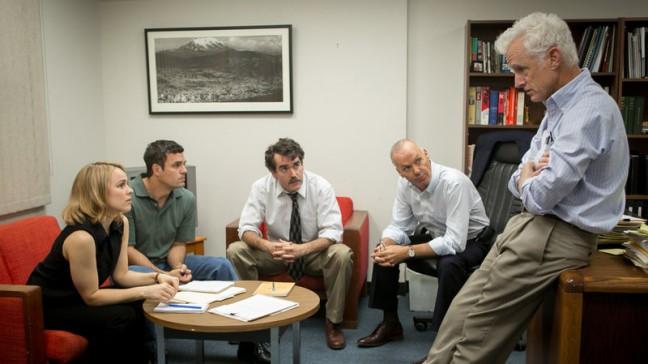Director Tom McCarthy’s latest film, “Spotlight,” depicts The Boston Globe’s story in 2001 that uncovered a massive sex scandal in the Catholic Church. It may be the most pointed film of the year, but by no means is it on the nose.
The film fades in as the changing of the guard occurs at the Boston Globe. The former editor-in-chief leaves and new head honcho Marty Barton (Liev Schrieber, “Creed”) takes over, an experienced, hard-hitting editor.
Initially it takes effort for Baron to convince stubborn assistant managing editor Ben Bradlee (John Slattery, “Mad Men”) to unearth piling allegations of sexual molestation against the Catholic Church in Boston.
Eventually, however, the investigative journalism department at the Globe, called “Spotlight,” readjusts their priorities and tackles the unfolding drama. What follows is a truly exceptional portrayal of events that has often become too common in headlines across the nation.
The Spotlight team is formed by the demure, yet confident Sacha Pfeiffer (Rachel McAdams, “True Detective”), bold, outspoken Michael Rezendes (Mark Ruffalo, “Avengers: Age of Ultron”), determined Matt Carroll (Brian d’Arcy James) and led by likable, but no-bullshit Walter “Robby” Robinson (Michael Keaton, “Birdman”). They interview victims of assault and attempt to uncover incriminating documents the Catholic Church has sealed off from the public.
A rapport between a tight script — co-written by McCarthy and Josh Singer — and solid performances from the A-list cast carry the film through its difficult subject. Each step the journalists take to get closer to the crux of the story is compelling enough for audience members to forget they’re in the middle of a procedural film.
The film makes great use of interviews as a method to show the individual trauma that composes the greater issue of unchecked sexual immorality, which ultimately denotes the magnitude of such egregious behavior on the part of supposed allies — priests. These interviews are never heavy-handed, but convey how each victim grapples with inner turmoil and the fear of speaking out.
While the narrative offers glimpses into the personal lives of each reporter on Spotlight, it restricts itself to just the essentials, resisting the temptation to overindulge the causality and exalt its protagonists, who don’t seek glory, but justice.
Perhaps the biggest character of the film is Michael. Ruffalo puts on one of the finest performances of his career as the unrelenting, brash metro editor. One scene in particular is especially poignant — Mike questions the choices Robby makes, worrying the Globe may not be acting quickly enough for the story to reach its full potential upon publication. This scene not only showcases Ruffalo’s impressive versatility as an actor, but also his ability to stand out in an ensemble of decorated, veteran performers.
Some film lovers, who will certainly enjoy the well-paced, taut narrative, will find the direction slightly dull. McCarthy misses several moments to capture the nuance of both the molestation victims and Spotlight, which would have created a strong sense of cohesion between these two main protagonists and the antagonist. But what the film lacks in cinematography it makes up in savvy dialogue and apt portrayals of journalists unwilling to settle for second-rate reporting.
Audience members will not exit the theater vilifying the Catholic Church. Rather, they will leave with the reinforced notion that, if performed to its full potential, journalism will always speak up for those without a voice and out against the ills of humanity that occur anywhere and in any context.


